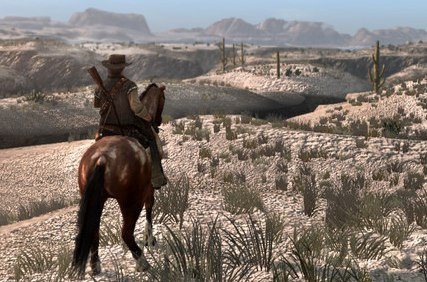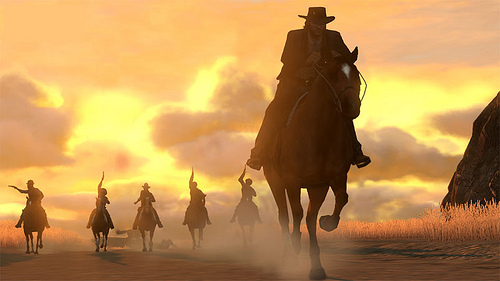* An analysis of the morality and ending of Red Dead Redemption, strong spoiler warning *
Finally, Rockstar have come up with a game that wants us to be good. Playing as a reformed outlaw in a graphically gorgeous title combining almost every aspect of the Wild West through films, TV shows and folklore, the most surprising quality of Red Dead Redemption – even more impressive than the amazing attention to detail – is the enforced morality and, in line with the game's title and its central theme, redeeming qualities of the main character. John Marston, contrary to those previous incarnations of Grand Theft Auto and other Rockstar Games' antiheroes, is not seeking success and wealth through crime; he is aspiring to be good for the betterment of himself and his family.
As in previous open-world games the players themselves are free to do as they wish, inevitably leading to a sandbox environment of carnage and chaos as the he/she sees fit. In Red Dead, the option to be 'good' or 'bad' is presented – do you capture criminals alive to collect bounty rewards and shoot the weapons out of people's hands instead of killing them, or decide to go renegade by robbing the innocent and, as an homage to the classic Western cliche of moustached villainy, tie a woman up and place her on railroad tracks? Despite your decisions in these situations and regardless of your own personal play-style, the most striking thing about the main story missions is how Marston always, from the start of the game to the finish, chooses the honourable route.

Blackmailed into hunting down his former brothers-in-arms by a pair of lawmen who have his wife and son held captive, Marston is sent out on a quest to essentially rid the land of the last surviving remnants of his own criminal past as the violent era of the American Old West comes to an abrupt end. Marston chooses to deal with hostile situations by speaking with restraint and politeness instead of pulling out his gun, and his actions throughout the story are often heroic, albeit through unavoidably violent means. So outside of the story missions when players may utilise their freedom to go out and commit evil deeds should they wish, it all seems a little inconsistent – hypocritical even – when compared with the predetermined intentions of the character during the game's cutscenes that drive the plot forward.
* Spoilers from this point on *
By the end when the violent and bloody missions are seemingly over and the police allow Marston to be reunited with his family, the game gets you to play through mundane chores tending to his farm, herding cattle, and spending quality time with the wife, Abigail, and estranged teenage son, Jack, who is more interested in reading than holding a weapon. It is quite the contrast to the majority of the game and, accompanied with a chillingly ominous score that haunts these segments, there is a feeling of impending doom: that this peacefulness is too good to be true.
It is no real surprise then when the lawmen return to betray and murder Marston and his family; on the contrary there is a sense that this is a true calling. A life as a simple rancher is not something John can adapt to, regardless of his intentions, and there is an acknowledgment at this stage of Red Dead that not only can this videogame character never escape his outlaw past, nor can the player escape from the violent dynamics of the game by which they are now well-accustomed to. John is deadly, remarkably efficient in killing those coming for his family – his prior sins have ensured that he is in his element when with a gun in his hand.
Marston manages to send his wife and son away on a horse with tears in his eyes and, having said his goodbyes and surrounded by the army and the police with no chance of survival, realises the price of true redemption – not for himself, but for his family – before taking a deep breath and accepting his fate. But the real tragedy of this finale is that, when his death should have been the end of the Marston family's affiliation with its dark past, it is actually through his passing that the once-innocent Jack seeks his own revenge, now controlled by the player 3 years later in the game. Violence begets violence and the son follows in the father's footsteps; exactly the sort of future John Marston had tried to protect Jack from.

The feeling of surprise and shock when playing as Jack deliberately merges the player's experience with this new character: Who am I? What do I do now? Not only has the player lost all their invested emotional connection with John, but so has Jack. And it surely says something of the impact and tragedy of the story's conclusion that, when assuming the role of the son, I immediately travelled across town to hunt down the policeman who ordered the execution – a bonus mission in the game – and going on a random rampage against the law looking for revenge instead of redemption, a pointless, empty lust for blood so commonly found in the genre which conflicted with and was completely contrary to the values John Marston had strived for and realised through his sacrifice. The Wild West was dying, and so too was that young Jack's apparent incorruptibility.
For all its technical qualities in creating a believable world outside of the player's influence and overlooking the flaws – namely the many unnecessary, superfluous supporting characters and, especially, the disappointing and drawn out missions towards the end involving Marston's former gang leader – Red Dead impresses most in its conflicted morality tale behind the familiar GTA-template, told through an excellently-realised and ultimately sad journey that lives up to the game's tagline, "Outlaws to the end".